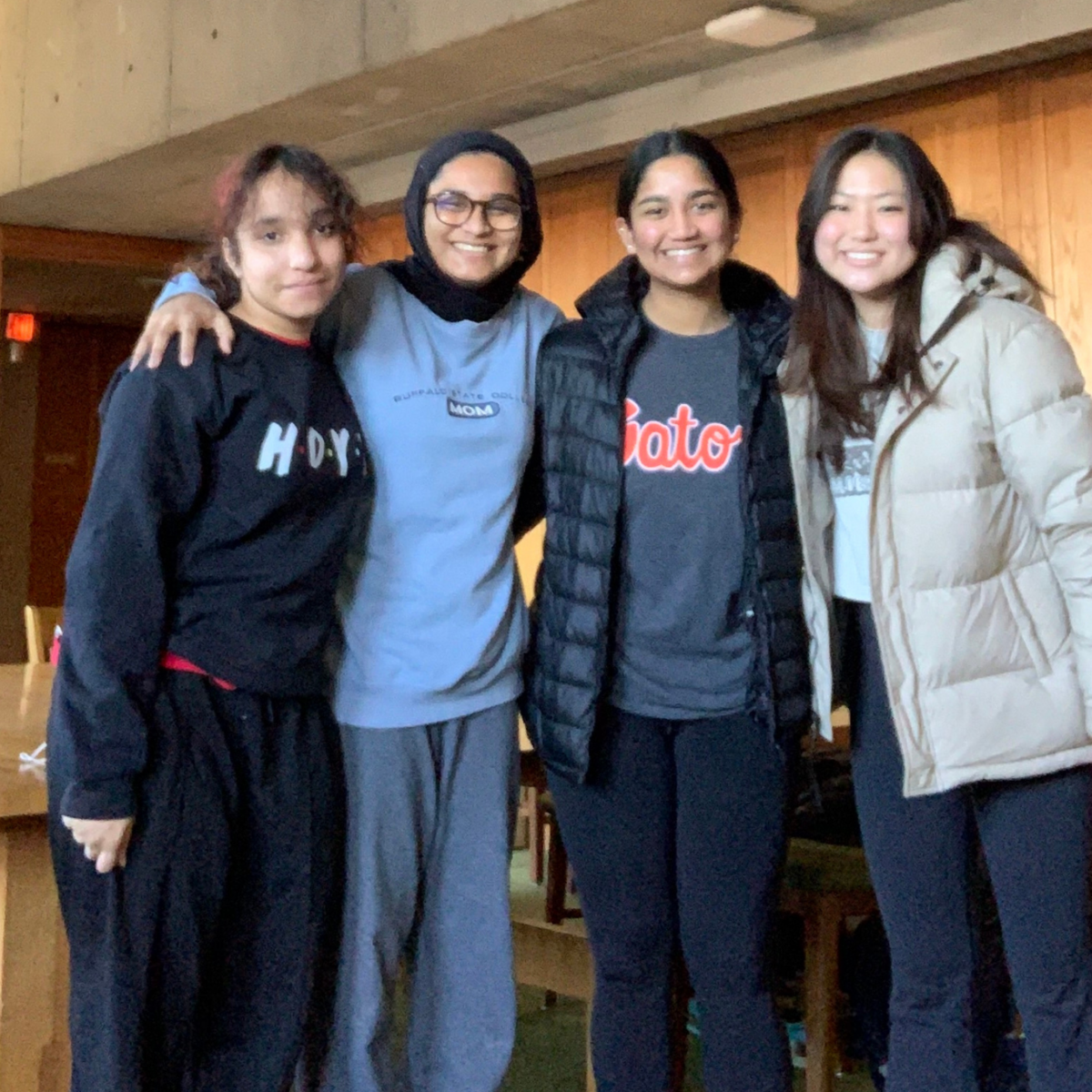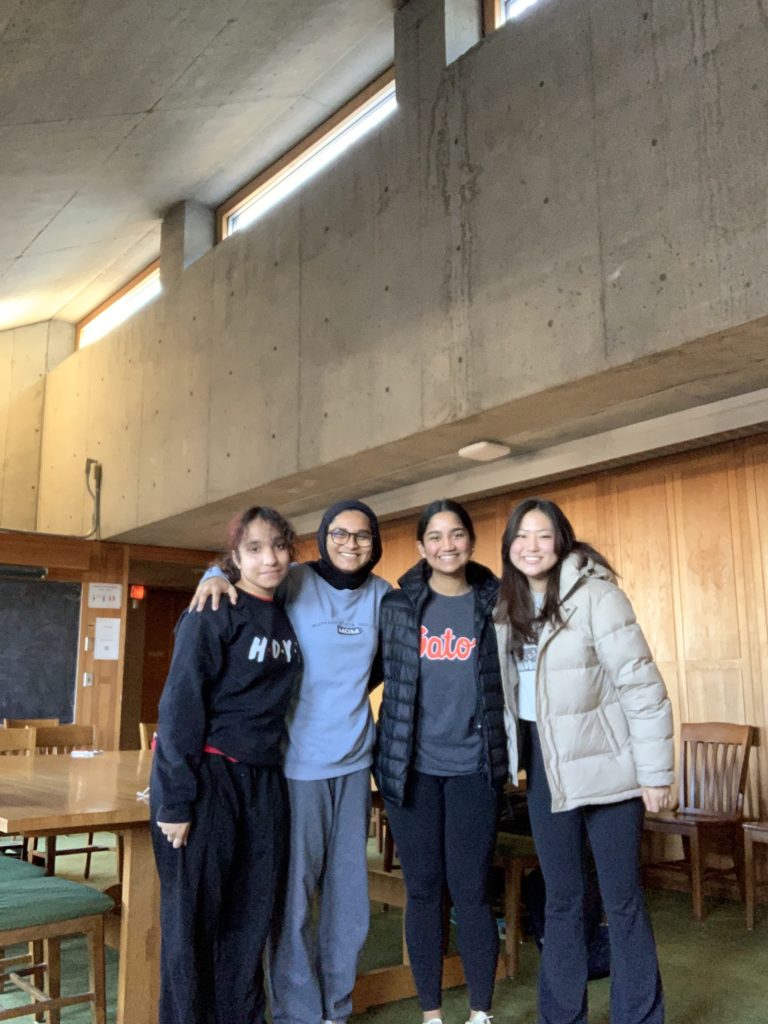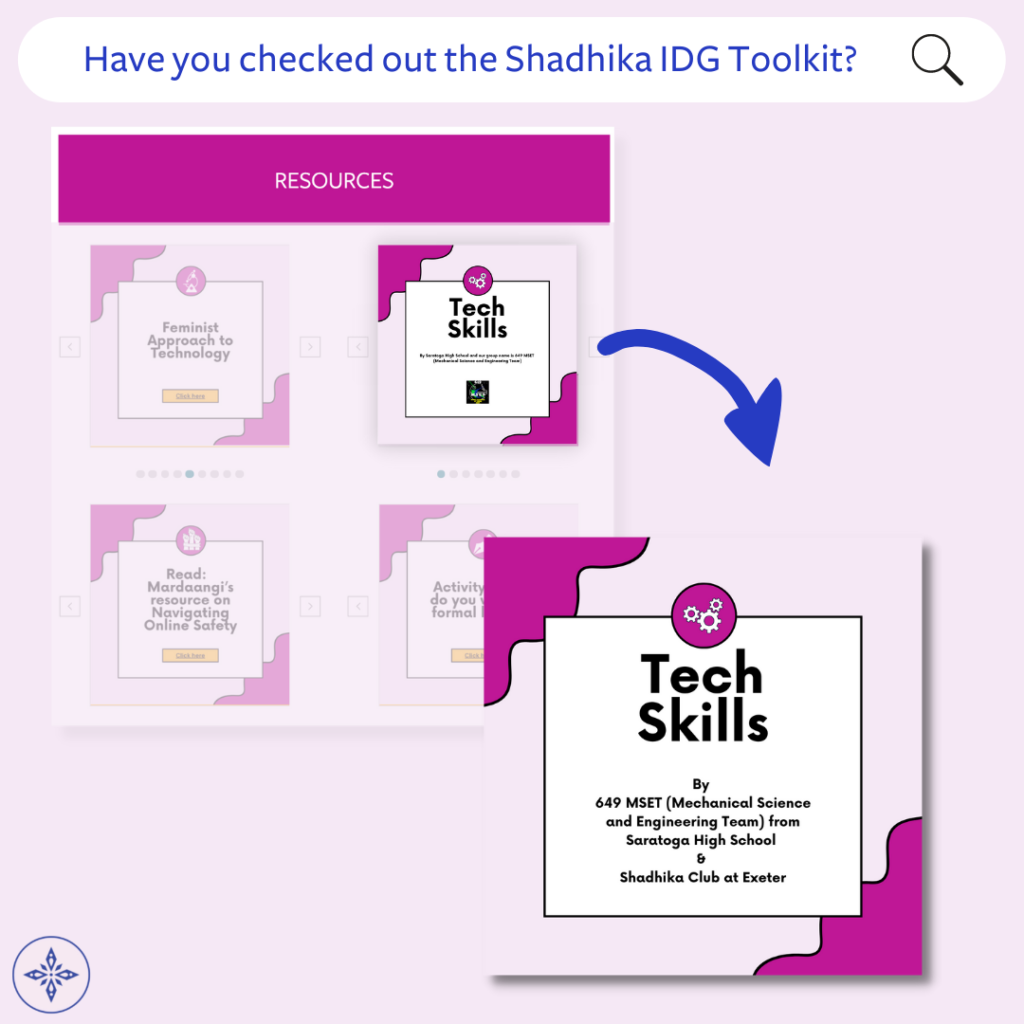
"When the opportunity came to take this dialogue and actually make an impact, we both knew that this was something we wanted to do. "
When She Leads: Lekha & Tasmiah
March 31, 2022
Reading Time: 11 minutesThis interview is part of our When She Leads Series. Learn more here.
- Can you introduce yourself to the Shadhika supporters?
Lekha: My name is Lekha Masoudi and I’m a senior at Phillips Exeter Academy, a boarding school in New Hampshire. I’ve lived in Denver, Colorado since I was a baby. I started the Shadhika Club along with Tasmiah at the beginning of my junior year. Besides heading the Shadhika club, I’m one of the presidents of the Model United Nations club and I also do Bollywood dance and am co-head of a club that tutors ESL for refugee high-school students in the Middle East.
Tasmiah: Hi! I’m Tasmiah Akter and I’m currently a senior at Phillips Exeter Academy. I’m originally from New York City, but my family is located in Buffalo, NY now. Along with Lekha, I’m a co-head of the Shadhika club on our school’s campus. I’m passionate about women’s issues, particularly women’s health and education. On campus, I am also co-head of the Neuroscience Club and a dorm proctor.

- How does Shadhika’s mission resonate with you?
Lekha: My mother’s family is from Kerala, one of the southernmost states in India. Although the state is perhaps best known for its tranquil beaches and beautiful rice paddies, Kerala’s literacy campaigns and strong education programs run by the government have led it to be one of the most economically successful states in India. The state has some of the lowest rates of child marriage and infant mortality in the whole country. Education was always highly valued in my family for men and women alike as a means to a better life. I love how Shadhika emphasizes not only using education as a way out of poverty but also as a method to effect social change. Once girls and women are educated, they are more empowered to speak up about their rights and to change the structures in their communities that prevent them from getting an education in the first place. I also appreciated Shadhika’s commitment to working with organizations on the ground. Community is so important in my family, and this commitment strengthens communities by encouraging women to become activists so that they can protect the people of their communities while fighting against harmful norms and unequal conditions.
Tasmiah: Shadhika’s mission resonates with me because of how the organization aims to make girls and women leaders in their own communities. Providing resources and services for education, health, job training, etc, is so invaluable but so is showing girls and women that they too can stand up and cause a change in their communities. Every girl has the potential to change the world and I admire that Shadhika provides the stepping stones for girls to get there. I think Shadhika also stuck out to me because I am part of a program that supports minority kids from the New York metropolitan area with getting into boarding schools. This program, called Prep 9, provides me with many resources and services so I can have a successful high school and college career. I would not be at Exeter if not for Prep 9. Ultimately, Prep 9 allows me to be a leader in my communities, similar to how Shadhika functions. I acknowledge that my situation is very different from the Shadhika girls’, but I do understand the power and impact that an organization like Shadhika can have.
- What prompted you to start the Shadhika Club at your school?
Lekha: I was familiar with Shadhika and had attended a few of their events before I came to Exeter. Especially with the devastating effects of the COVID-19 pandemic, I wanted to help disadvantaged communities in India in any way I could. I also noticed that there was not a lot of dialogue around issues in South Asian countries and communities at my school, and wanted to raise awareness of these issues as well as directly help women and girls in India. Starting a Shadhika club was the perfect opportunity to do both. I have been a part of Paper Airplanes, a nonprofit chapter at my school that tutors refugees in ESL since my freshman year. This club showed me firsthand the importance of interacting directly with disadvantaged communities to motivate fellow students to help these communities advocate for themselves. I knew that Shadhika would provide this for my fellow students. Just as the mission of effecting change from the bottom-up inspired me, it’s been so great to see other Exeter students inspired by this mission and by working in this club.
Tasmiah: During our sophomore year, Lekha brought up the idea of starting a club at school that would help or support girls in South Asia in some way because as she mentioned in her response, there is a lack of dialogue around these issues at our school. When Lekha showed me Shadhika’s website, we thought that this would be a great organization to partner with, especially as two South-Asian girls who often discuss gender disparities in our communities. Lekha is Indian and I am Bangladeshi and we’ve spent a lot of time unpacking gender roles and societal norms in our everyday lives. When the opportunity came to take this dialogue and actually make an impact, we both knew that this was something we wanted to do.
- Could you tell us more about the work the Club does and how it impacted your schoolmates?
Lekha: Our efforts have mainly been focused on raising awareness and creating resources and connections between the students in the Club and the girls and women Shadhika serves. We use social media and physical mediums like bulletin boards to educate students about what Shadhika does and why it is important to support Shadhika’s mission. We also started a pen-pal program with some of the Shadhika girls that I hope can be continued in the future. It was so amazing to see how enthusiastic our members were about writing to their pen-pals and forming these connections. I personally am most proud of our technology guides. It’s easy for us to take tech literacy for granted, but our members produced some fantastic guides that I hope will be helpful resources for the Shadhika Scholars as they navigate education and jobs training.

Tasmiah: Shadhika started off by doing a lot of awareness-raising because though club members had an idea of what kind of issues we might be looking at, no one really knew the full extent of things. Before we could teach club members about anything, Lekha and I educated ourselves so we could talk about things in an accurate and respectful manner. Then, through various documentaries, articles, and movies, the club learned about many topics including casteism, systemic misogyny in the criminal justice system, and exploitation in the textile industry. After educating ourselves and then the club members, we shifted toward more direct-impact projects. Our club members really enjoyed these projects and felt fulfilled knowing that they were lending a hand to a girl somewhere across the world.

- If you had to share 2 takeaways from your time at the Club, what would they be?
Lekha: To be adaptable when we run into issues and to stay focused on our mission. With COVID, many of our plans got interrupted but we had to learn how to quickly adapt and do what was best for the organization. Although some of these difficulties were discouraging, remembering the ultimate goal of the club and of Shadhika as a whole kept me motivated to keep working through the roadblocks.
Tasmiah: 1. It is important to give every girl and woman the space and opportunity to advocate for herself.
2. It is very difficult to execute a vision without partners and I am very grateful to Lekha for being such a role model partner throughout our leadership of this club.
- What do women and girl-led leadership mean to you? Is there a role model or mentor who’s motivated you to keep going even when the ‘going got tough’?
Lekha: I think girl-led leadership is important because women and girls can often provide a very holistic, interconnected view of their communities. Throughout history, we can see how women have fought not only for their own rights but for the rights and well-being of their communities as a whole. I have always been inspired by the women in my life. My two biggest role models with Shadhika have been my mom, who has always been there for me and provided some great suggestions for the club, and Tasmiah. Tasmiah has been such an amazing friend and peer to me and I feel so honored to be witness to her creativity, kindness, intelligence, and sense of humor. We faced issues, but we faced them together. She always kept me motivated with her great ideas and effective leadership and I can’t think of someone who I would rather have started the club with.
Tasmiah: Women and girl-led leadership to me mean leadership that has the potential to inspire more girls and women to be leaders in the future. It’s very difficult for me to choose just one role model because I’ve been fortunate enough to have so many but I must mention Lekha. I’ve worked with a lot of different people on a lot of different things on campus but working with Lekha has not only been easy but also enjoyable. I think we’re both good at really different things and complement one another well in the ways that we lead. She is a great public speaker, has an amazing work ethic, is so smart, and is really good at planning out how to move people towards accomplishing a goal. I hope that we both served as good role models for future club heads.
- What is something you’re working on or something new that you’re looking forward to?
Lekha: As we prepare to graduate, I know that our club is in good hands. I’m looking forward to training the next generation, so to speak, of Shadhika leaders and members and broadening our scope. We hope to include some environmental justice programming during our spring term. More generally, I’m incredibly excited to go to college, meet more inspiring women, and keep working to make a difference in my communities and the world.
Tasmiah: I think I’m just ready for whatever is next. I’m proud of the work we’ve done in the Shadhika club and am ready to help the next club heads in any way I can. Because of Shadhika (the organization and club), I am now sure that I want to keep women’s issues in mind in whatever I pursue in college. In whatever clubs or organizations I am a part of or lead in the future, finding a co-head/partner that will live up to Lekha’s sheer amazingness will be difficult.
- If you could give one piece of advice to young women and girls, what would it be?
Lekha: My biggest piece of advice would be to support your communities without being afraid to “call out” negative aspects or to make a change. Although it can definitely be difficult (and it has been for me!) learning to stand up for yourself and your needs is the first step. Look out for other girls and women, especially ones from marginalized identities, in your community. Solidarity is so important when it comes to effecting change. Ultimately, you as a community member have a unique handle on how to empower your community and make it thrive. Your voice is incredibly valuable and needed in today’s world!
Tasmiah: Lead with conviction and care.
Read more